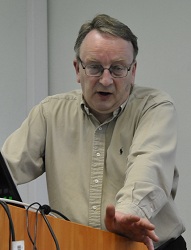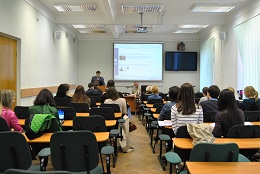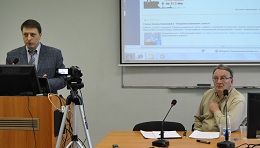- A
- A
- A
- ABC
- ABC
- ABC
- А
- А
- А
- А
- А
- HSE Campus in St. Petersburg
- School of Arts and Humanities
- Department of History
- News
- Aftershocks of Empire: Debating the Decolonisation in Britain today
-
Department
-
Educational programmes
Address:
190068 Saint Petersburg
123 Griboedov channel, Room 123
Phone:+7 (812)786-92-49
Postal address:
190068 Saint Petersburg
123 Griboedov channel
The Department of History was created in 2012. The overarching goal of the department is systematic development of the field of global, comparative, and transnational history as a potent tool of overcoming the limitations of national history canon, fostering interdisciplinary dialogue in the field of social sciences and humanities, and brining new public relevance to historical knowledge. The department mission includes the development of new type of historical undergraduate and graduate education in Russia and pioneering new research fields in Russian historiography in dialogue with the global historical profession.
 Social History of the True Orthodox Christians Wandering in Russia. Capitalism, Communism, and Apocalypse, 1900-1930
Social History of the True Orthodox Christians Wandering in Russia. Capitalism, Communism, and Apocalypse, 1900-1930
In press
L.; NY: Routledge, 2025.
Chukcheeva M.
Nineteenth-Century Art Worldwide. 2025. Vol. 24. No. 3. P. 246-254.
In bk.: Women, Gender, and Technosciences, 1900–2020. A Beard to Govern. Routledge, 2025. Ch. 7. P. 123-140.
Khvalkov E., Levin F., Кузнецова А. Д.
Working Papers of Humanities. WP. Издательский дом НИУ ВШЭ, 2021

Aftershocks of Empire: Debating the Decolonisation in Britain today
The first meeting of the academis seminar “The Boundaries of History” of the Center for Historical Research and the Faculty of History of the Higher School of Economics in St. Petersburg has taken place on the May 15th, 2012.
 The report “Aftershocks of the Empire: Debating the Decolonisation in Britain today” was introduced by Stephen Howe, Professor of History and Culture of Colonialism at the Department of of Historical Research at the University of Bristol. Alexander Semenov, the Dean of the Faculty of History, was the moderator of the after-seminar discussion.
The report “Aftershocks of the Empire: Debating the Decolonisation in Britain today” was introduced by Stephen Howe, Professor of History and Culture of Colonialism at the Department of of Historical Research at the University of Bristol. Alexander Semenov, the Dean of the Faculty of History, was the moderator of the after-seminar discussion.The panel was devoted to rethinking of the history of decolonization. The report revealed one of the possible views on the relationships between law and enforcement in history. One of the highlighted issues, to which Stephen Howe drew a special attention, is the recent discovery of the colonial archives of the Foreign Office evacuated from the former British territories all around the world. The existence of those documents, which cover various aspects of the British administration, including the data related to the last years of the Empire, was kept back for a long time. Disclosure of the documents was the result of a notorious trial in the High Court of London in the case of four Kenyans tortured by the British administration and the military during the Mau Mau rebellion in the 1950s., defending their rights to get compensation from the British government. The fact of concealment of these documents, which should have been transferred to the public archives by law back in the 1980s., put the Foreign Office in a very awkward position. The official discourse of decolonization as "liberation" of the subject nations provided by
 Britain of is now likely to be subjected to a major revision.
Britain of is now likely to be subjected to a major revision.It was noted that the history of empires and decolonization is one of the biggest challenges in framing a coherent narrative of national history in modern European countries and a challenge for the policymakers, as for the professional historians. At the same time, Stephen Howe criticized the practice of legislative regulation of the debates field, which is taking place, for example, in modern France.
Report aroused a great interest of the audience, which were teachers and students of the Higher School of Economics in St. Petersburg, St. Petersburg State University and other universities.
 Questions and answers session lasted longer than the panel itself. Such topics as influence of a professional group of historians in Britain, the reasons of the specific "painfulness" of imperial history, the dangers of dichotomy of "condemn" and "justifying" models of perception of the past have been touched on.
Questions and answers session lasted longer than the panel itself. Such topics as influence of a professional group of historians in Britain, the reasons of the specific "painfulness" of imperial history, the dangers of dichotomy of "condemn" and "justifying" models of perception of the past have been touched on.

